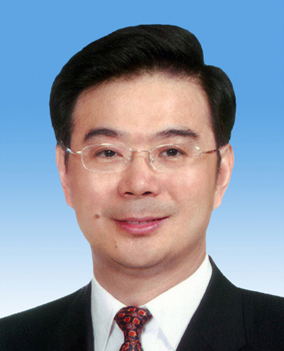Zhou Qiang
周強
 0 Comment(s)
0 Comment(s) Print
Print E-mail China.org.cn, March 15, 2013
E-mail China.org.cn, March 15, 2013

Zhou Qiang was elected president of China’s Supreme People’s Court, during the first session of the 12th National People's Congress in March 2013.
Zhou was born in Huangmei of Hubei Province in April 1960. Like many of his contemporaries, he was sent off to the rural Dushan Community of Huangmei for re-education from 1976 to 1978.
In 1978, Zhou was admitted to the Southwest University of Political Science and Law. The following is an overview of his academic and professional experience:
From 1978 to 1982, Zhou attended the Southwest University of Political Science and Law and graduated in the field of law.
From 1982 to 1985, he undertook a postgraduate degree, majoring in civil law, at the Southwest University of Political Science and Law
From 1985 to 1989, he was an official with the Policy Research Office and the Law and Regulations Office of the Law Department of the Ministry of Justice
From 1989 to 1991, Zhou acted as deputy director of the Law and Regulations Office of the Law Department of the Ministry of Justice.
From 1991 to 1993, he became the director of the Law and Regulations Office of the Law Department of the Ministry of Justice. During that period, from March 1993 to September 1993, he temporarily transferred to the Justice Bureau in Shenzhen of Guangdong Province, to work as the assistant of the bureau’s director.
From 1993 to 1995, he was deputy director of the Executive Office of the Ministry of Justice and director of the Minister Office.
From 1995 to 1995, Zhou acted as director of the Law Department of the Ministry of Justice.
From 1995 to 1997, he became a member of the Secretariat of the Central Committee of the Communist Youth League. From September, 1995 to July, 1996, he attended an additional one-year training class at the Party School of the Central Committee of the Communist Party of China (CPC).
From 1997 to 1998, he was the executive member of the Secretariat of the Central Committee of the Communist Youth League.
From 1998 to 2006, he was the first secretary of the Secretariat of the Central Committee of the Communist Youth League. From November, 2005 to January 2006, he attended classes on economic institutional reform organized especially for provincial-level officials at the Party School of the Central Committee of the CPC.
From 2006 to 2006, Zhou became deputy Party secretary of Hunan Province, acting governor of Hunan Province and first secretary of the Secretariat of the Central Committee of the Communist Youth League
From 2006 to 2007, he was deputy Party secretary of Hunan Province and acting governor of Hunan Province.
From 2007 to 2010, Zhou acted as deputy Party secretary of Hunan Province and governor of Hunan Province.
From 2010 to 2010, he was Party secretary of Hunan Province.
From 2010 to 2013, he became Party secretary of Hunan Province and director of the Standing Committee of the People’s Congress of Hunan Province.
From 2013 onwards, Zhou became president of the country’s Supreme People’s Court, secretary of its Leading Party Members’ Group, Party secretary of Hunan Province (until March 2013) and director of the Standing Committee of People’s Congress of Hunan Province (until May, 2013).
Zhou has been a member of the 16th, 17th and 18th Central Committee of the CPC and the ninth Standing Committee of the National People’s Congress.?





